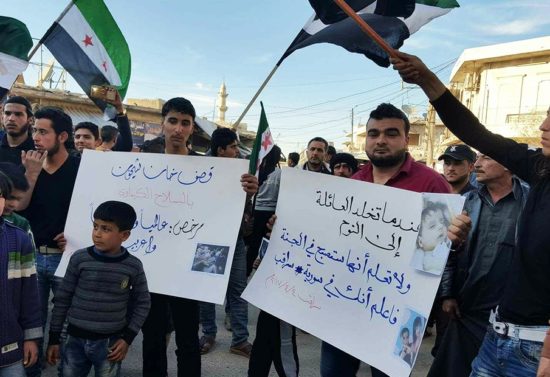Dr. Zafar Nawaz Jaspal |
For the last seven years, the people of Syria have been victim of civil war. The Syrian ruling elite seems confident about the restoration of authority of the government in the entire Syria. Conversely, the rebels are equally sure that they will overthrow the President Bashar al-Assad regime. Ironically, both sides have been relying on their external backers. Whereas; the involvement of the foreign forces only sharpen the societal faultiness and complicate the internal affairs of the country.
The Syrian nation is ethnically and religiously diverse society. The governing institutions have not accommodated societal diversity properly since the independence of the state in 1946. For instance, most Syrians are Sunni Muslims, but members of the minority Alawi sect, of whom President Bashar al-Assad is a member, have long dominated Syria’s security establishment. Therefore, the weakening of iron-fisted Assad regime sparked civil war in the country.
Russians, Iranians, Iraqis and Turks desire to improve their relations with the Western countries. Despite it, they are not prepared to yield to the Western powers Syrian agenda. To conclude, the bombing is not a solution of the Syrian imbroglio.
President Bashar al-Assad has been encountering legitimacy question since March 2011. The peaceful protestors, encouraged by the Arab Spring, had demanded change in the political system of Syria. Indeed, the alteration in the political system to promulgate democratic political system was not acceptable to the ruling elite. The Bashar al-Assad government’s militaristic reaction to pro-democracy protestors unleashed violent multi-sided conflict in the country, which has assassinated at least half a million people.
Read more: The Syrian quagmire: Bloody war continues
The weakening of Asad regime resulted in the emergence of the Islamic State of Iraq and the Levant (ISIL, also known as ISIS) in 2013. It multiplied the miseries of the Syrian people. Asad government was incapable to check the increasing influence of the radicalized terrorist organization due to the pro-democratic demonstrations. The ISIL announcement to reestablish Caliphate alarmed the regional and great powers. The US led an international coalition bombed ISIL targets in Syria. Turkish troops launched several operations against the ISIL.
Many other regional actors, including Israel, interfered in the internal affairs of Syria to quash the terrorist organization. In September 2015, Russia also launched a bombing campaign against ISIL in Syria. The recent Syrian crisis sparked due to the alleged chemical weapons attack against civilians in Douma on April 7, 2018. Since Obama administration the Americans have been warning Damascus that the use of chemical weapons in Syria was a ‘red line’ that would prompt military intervention.
Ironically, both sides have been relying on their external backers. Whereas; the involvement of the foreign forces only sharpen the societal faultiness and complicate the internal affairs of the country.
Last week United States likeminded states concluded that Asad loyalists used chemical weapons against the opposing groups. The government while denying the charges, asked for OPCW investigation. Without waiting the findings of OPCW, on April 14, 2018, United States, France and Britain launched missile strikes on Damascus over a suspected poison gas attack. Although, the Western governments have openly been supporting the rebels in Syria, yet they claim that their recent missile strikes were only to desist Damascus from using chemical weapons.
Read more: Trump warns Russia of ‘smart missile strikes’ over Syria crisis
British Prime Minister Theresa May stated: “So there is no practicable alternative to the use of force to degrade and deter the use of chemical weapons by the Syrian regime. This is not about intervening in a civil war. It is not about regime change.” The critics, however, are convinced that the missile strikes were conducted to weaken and topple the Assad regime. Russians expressed their serious concerns over the recent Western powers missile strikes on Damascus.
While condemning the Western powers missile strikes, the Moscow claimed the allegations of a gas attack in Douma was “staged by Britain to whip up anti-Russian hysteria.” On April 15, 2018, Russian President Vladimir Putin cautioned that further Western attacks on Syria would lead to chaos in international affairs. Though Russians forces refrained from direct involvement in defence of Damascus, yet Russian supplied air and missile defence system destroyed many incoming missiles.
The recent Syrian crisis sparked due to the alleged chemical weapons attack against civilians in Douma on April 7, 2018. Since Obama administration the Americans have been warning Damascus that the use of chemical weapons in Syria was a ‘red line’ that would prompt military intervention.
The regional actors, especially Turkey, Iraq, and Iran have their legitimate interest in the internal stability of Syria. Being bordering states, they are suffering from the spillover effect of the Syrian internal crisis. Therefore, they are actively involved in the Syrian imbroglio. The active involvement of both Turks and Iranians is not acceptable to the protestors. Nevertheless, the backers of Bashar al-Assad are in serious trouble.
Read more: Vladimir Putin snubs France after Syria war crimes comments
Russians, Iranians, Iraqis and Turks desire to improve their relations with the Western countries. Despite it, they are not prepared to yield to the Western powers Syrian agenda. To conclude, the bombing is not a solution of the Syrian imbroglio. The internal and external Syrian stakeholders need to chalk out a political solution of the crisis to end the miseries of the Syrian people.
Dr. Zafar Nawaz Jaspal is Associate Professor, School of Politics and International Relations, Quaid-i-Azam University, Islamabad. He is also an advisor on Non-Proliferation to SASSI, London and a course coordinator at Foreign Services Academy for the Pakistan Ministry of Foreign Affairs. Email: jaspal_99@hotmail.com. This piece was first published in Pakistan Observer. It has been republished with permission. The views expressed in this article are the author’s own and do not necessarily reflect Global Village Space’s editorial policy.














